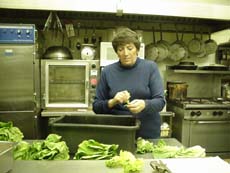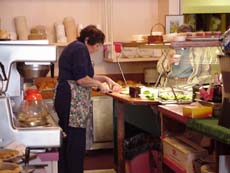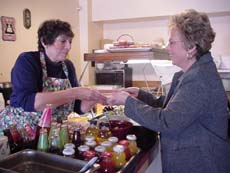|
It
still is. For a dedicated group of patrons, it would be difficult to
imagine Lincoln today without Vintage Fare. A little before noon on
weekdays, lines begin to form inside the place Joyce calls her
"lunch business" at 414 Pulaski St., where sheís behind
the counter making sandwiches, ladling out one of her two homemade
soups or dishing up the dayís fare. Sometimes the lines go right
out the door and down the sidewalk, but her customers wait
willingly. They know the food they are going to get is "made
from scratch," fresh (the rolls are baked daily), healthful
(Joyce doesnít serve fried foods or use additives or
preservatives) and most of all, delicious.

[Kinzie's kitchen, remodeled by husband Mel, displays
some of her collection
of brass and copper and her dinnerware, which she collected over the
years
from antique shops]
Many
customers come for carryout, taking sandwiches, salads and desserts
back to their offices. Others, like Marilyn Weingarz, prefer eating
in, seeing people they know, chatting a while. "You meet so
many interesting people while youíre eating the excellent
food," she says.
The
Maple Club, on 1458 State Route 121 just outside of Lincoln, offers
other opportunities to enjoy Joyceís food, perhaps at a dinner
theater, a private party for a club or business, a wedding
reception, or a special occasion such as Christmas, Easter, or
Motherís Day. While the young and well-trained wait staff will
probably serve the food, Joyce will be behind the scenes, in charge
of the entire dinner production.
In
1988, Joyce opened the Maple Club as a dinner theater with a
partner, the late Alan Tidaback. One year later she began serving
lunch on weekdays at Vintage Fare. But her history of community
involvement goes back to her early years in Lincoln.

[Kinzie prepares the day's food in the Maple Club
before transporting thecuisine to downtown's Vintage Fare]
Her
children, David, Catherine and John (who was born after moving to
Lincoln) attended the Lincoln public schools, so Joyce became
involved in school affairs, along with the Lincoln Junior Womenís
Club, the First Presbyterian Church and the League of Women Voters.
One
of the Leagueís projects was a study of the school districts in
the Lincoln area, which then had five elementary districts and a
separate high school. The study recommended combining all six
existing school districts into one. Joyce was convinced that a unit
district would be "the best educational climate" for
Lincoln students and ran twice on that platform for a seat on the
Lincoln Community High School board. She was defeated both times.
The community wasnít ready to accept the idea then, and, although
several of the elementary schools districts have since combined, it
still has not become a unit district.
But
one disappointment did not stop Joyce from continuing to work for
her childrenís schools. She was appointed to a seat on the
Elementary District 27 board, where she served for 10 years, several
of them as president.
Joyce
was also an early member of the Community Concert Association, which
she remembers as "a struggling group of about 300," and
helped steer it to become the successful program it is today. With
Tidaback, whom she describes as "the moving force," she
worked to establish the Lincoln Community Theater, which puts on
three to five plays every summer.
She
also sat on the Abraham Lincoln Memorial Hospital Board and was
president of the Junior Womenís Club. Her leadership was
"outstanding," says fellow Womenís Club member Judy
Lumpp.
The
"bustling little city" that Joyce and Mel saw in 1965
quickly became home, even though both still had family back in
Minnesota. The children were in school and doing well. But in order
to stay, the Kinzies had to make a difficult decision. Mel, who had
been managing the Jupiter Store for the S. S. Kresge Company (a
transition from the old five-and-10-cent stores to the coming
K-Marts), was asked to move again. He made a "corporate
compromise" and chose to go to Decatur to manage a K-Mart so
the family could stay in Lincoln, making the daily commute for more
than 10 years.
From
the beginning Joyce and Mel have been regular members of the First
Presbyterian Church. Joyce was on the search committee that brought
the Rev. Bruce Allison to the Lincoln church in the early 1980s.
"He quickly became one of my dearest and best friends,"
she says. "He was the most Christian person Iíve ever known.
He was the definition of compassion and he was completely
non-judgmental. The fact that he loved to cook was another
bond." His sudden death in 1990 during a surgical procedure was
a great blow to the church and to Joyce.
She
lost another good friend when her business partner, Tidaback, a
former Lincoln Community High School vocal music teacher, died in
1994. During their partnership the club put on five or six shows a
year, each running for three weeks. Some she remembers as
outstanding were "H.M.S. Pinafore," "Grease,"
"On Golden Pond," "I Do, I Do" and "Same
Time Next Year." With the help of many talented theater people
in the area, she still provides dinner and entertainment at the
Maple Club.
"I
think she is to be highly commended for starting the Maple Club
dinner theater," says Valecia Chrisafulli, a longtime friend.
"Once she has a goal and a vision she works hard to achieve it.
Joyce is a big picture thinker. She knows how to put concepts
together for the best interest of everyone in the long run.
"Life
needs some continuity, and we tend not to value old things. We have
a 30-second attention span. Letís keep the look that has been part
of our community," she says. "If we have the vision, a
functional building can be put within those walls."
"A
rare lady," is the way another long-term friend, Dr. Deane
Doolen, describes her. "The root of her person is that she is
so intelligent. She can interpret and separate the wheat from the
chaff." She is also a nurturer, especially good with older
people," he points out.
"My
mother and father were very fond of Joyce. My sister moved to
Seattle, so they didnít have a resident daughter. Joyce became
their surrogate daughter. Joyce and Mel made my parents' senior
years a good bit more pleasant than they would otherwise have
been."
"She
does so many things that no one ever knows about," says another
friend, Marty Fulton. There are so many people she has fed when they
are sick or have family problemsóshe shows up on the doorstep with
a meal. She has a wonderfully big heart and is extremely
generous."
|

Joyce
learned to understand and respect good food at an early age.
"My mother just inherently knew how to cook. She didnít write
down recipes, but she made the best food I ever tasted. She made
meat loaf that was as good as prime rib.
"She
was an unusual woman for her time. She always worked, most of the
time as a seamstress in what we today would call a sweatshop. She
one was of the earliest union members, joining the International
Ladiesí Garment Workers Union. After work she came home and cooked
a really fine meal because she felt that was good for us."
Her
mother, Bessie, came from Lebanese parents. Joyce describes her
cooking as "modified Middle Eastern, to suit an American
husband." At the home of her Lebanese grandparents, she
remembers, "We had real Middle Eastern food: tabouli, baklava,
cabbage rolls with lamb and rice, stuffed grape leaves, yogurt and
kibbie (ground meat and cracked wheat cooked in oil)."
Like
Joyce, her mother was a risk-taker. "Melís first job when he
got out of the Army was in a bank in St. Paul," she remembers.
"The bank had decided to start an employee lunch program. They
took a little corner in the basement and turned it into a kitchen.
My mother wanted a job then, so she went to the bank and said, ĎI
can do that.í
"No
one told her what to do or what to cook. She did all the buying,
planning, and cooking, and she served the bank employees a fabulous
lunch. Thinking about it, I find the parallel overwhelming. She did
virtually the same thing I do at Vintage Fare."
From
Melís mother, Lily, Joyce learned about German/Midwestern cooking,
especially baking. "When Mel was in the Army his mother wrote
to us every week. We seldom got a letter without a recipe, which she
called Ďreceipt.í The recipe didnít just list the ingredients,
but gave directions on just how to make it."
Another
big culinary influence was her church. "In St. Paul we were
active in church, and there were always suppers, banquets, sunrise
breakfasts. I was taken under the wing of the older women in the
church and learned to cook in quantity. Even if I was just peeling
potatoes, I was seeing how it was done."
Joyce
continued cooking when she came to Lincoln. "I had a friend in
the catering business, Barbara Gleason. She needed people to help
work. I was a stay-at-home mom then, and I would help."
When
Barbara moved away, Joyce and Pat Bay formed Lincolnland Catering,
which they continued together until Joyce opened the Maple Club. Bay
still runs the catering service.
Later
Joyce and Mel bought the Gem Restaurant, in the building that now
houses Vintage Fare. "It was not my kind of food," Joyce
recalls. "It was big breakfasts, a lot of fried food. That kind
of food served a wonderful purpose in its day, but you canít eat
like a farmer if you donít work like a farmer.

[Making sandwiches or ladling soup right in front of
the customers is part of the Vintage Fare experience]
"I
love what I do now. I call myself an Ďinspirational cook.í That
means I cook what Iím inspired to cook that day. I like the
challenge of just going in and doing it, not saying, ĎI have to
fix this and that today.í
"Although
some items are always on the menu, flexible food preparation allows
me to take advantage of the best ingredients available at the best
prices. When strawberries are ripe Iíll make strawberry pie, but I
wonít promise you one in January.
"What
I do gives me a lot of satisfaction. Iím putting myself into the
food I make. I want to have control of the process from beginning to
end. I can hire help, but I canít hire the desire I have to make
it come out right," she explains.
Serving
the food at Vintage Fare completes the process that begins early in
the morning at her kitchen in the Maple Club. "People share
their experience of my food with people they bring in. Because Iím
here, I get a first-hand response. My clientele is not just people
that work downtown, but also people from out of town. Two ladies
from Bloomington come almost every other week, for example."

[Every customer appreciates Kinzie's personal touch]
Doolen
says if there is one word that describes Joyce, it is
"multifaceted." Not only is she the consummate cook and
the competent businesswoman, she is a devoted and creative gardener.
She doesnít believe in lawns (why waste energy and resources
mowing?) so she has most of her yard in garden and ground cover and
is always looking for a new perennial to add to her collection.
Itís
hard for her to pass an antique store because she might find another
interesting piece of her china pattern, Franciscanís
"Coronado." The pattern came out the year she was born and
was last made the year she graduated from high school.
None
of her furniture came from a retail store either. "Iíve
always liked giving old things new life," she says. Her dining
room table once belonged to her mother.
An
avid reader, she doesnít feel her day is complete if she hasnít
spent several hours at night with a good book, and she is current on
the major films of the day.
Lumpp
sums her up. "I think she is truly a beautiful person. She has
a kind voice, a warm smile and the best recipes in the world."
[Joan
Crabb]
|

